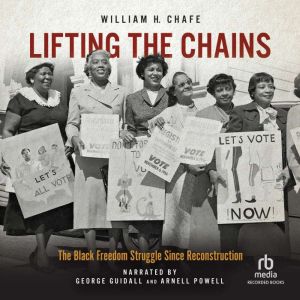

List: $24.99
| Sale: $17.50
Club: $12.49
Lifting the Chains
The Black Freedom Struggle Since Reconstruction
Author: William H. Chafe
Narrator: George Guidall, Arnell Powell
Unabridged: 13 hr 35 min
Format: Digital Audiobook Download
Publisher: Recorded Books
Published: 08/29/2023
Synopsis
Lifting the Chains is a history of the Black experience in America since the Civil War, told by one of our most distinguished historians of modern America, William H. Chafe. He argues that, despite the wishes and arguments of many whites to the contrary, the struggle for freedom has
been carried out primarily by BlackAmericans, with only occasional assistance from whites. Chafe highlights the role of all-black institutions—especially the churches, lodges, local gangs, neighborhood women’s groups, and the Black college clubs that gathered at local pool halls—that
talked up the issues, examined different courses of action, and then put their lives on the line to make change happen.
The book draws heavily on the tremendous oral history archives at Duke that Chafe founded and nurtured, much of which is previously unpublished. The archives are now a collection of more than 3,600 oral histories tracing the evolution of Black activism, managed under the auspices
of the Duke Center for Documentary History. The project uncovered the degree to which Blacks never gave up the struggle against racism, even during the height of Jim Crow segregation from 1900 to 1950. Chafe draws on these valuable resources to build this definitive history of African
American activism, a history that can and should inform Black Lives Matter and other contemporary social justice movements.
been carried out primarily by BlackAmericans, with only occasional assistance from whites. Chafe highlights the role of all-black institutions—especially the churches, lodges, local gangs, neighborhood women’s groups, and the Black college clubs that gathered at local pool halls—that
talked up the issues, examined different courses of action, and then put their lives on the line to make change happen.
The book draws heavily on the tremendous oral history archives at Duke that Chafe founded and nurtured, much of which is previously unpublished. The archives are now a collection of more than 3,600 oral histories tracing the evolution of Black activism, managed under the auspices
of the Duke Center for Documentary History. The project uncovered the degree to which Blacks never gave up the struggle against racism, even during the height of Jim Crow segregation from 1900 to 1950. Chafe draws on these valuable resources to build this definitive history of African
American activism, a history that can and should inform Black Lives Matter and other contemporary social justice movements.